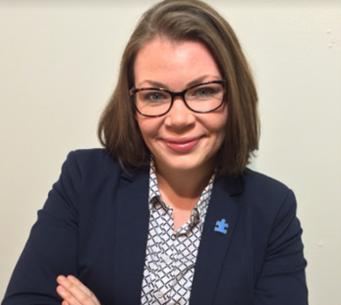Every Spring, I welcome the rainbows that pop up on t-shirts, yard flags, logos and in storefront windows to commemorate Pride Month in June. They send an important message: you are welcome here.
As a lesbian woman, I always beam with pride about my family, my wife and now almost 5-year-old son. But like most in the LGBTQIA+ community, I have faced many situations that dictated my ability to live as openly and authentically as I wanted, where sometimes safety was the deciding factor. Growing up as a young LGBTQ identified person, I paid close attention to curating the spaces and people I was around, always testing if I could be my true self. Would it be safer to avoid conversations about partners or refrain from holding hands on public transportation? It was exhausting. Other parts of my identity – social worker, coffee lover – didn’t require such effort or involve potential risk assessments tied to disclosure.
Now as Vice President of Services and Supports, Community Impact here at Autism Speaks, I am witness to many situations that dictate the health, safety and livelihood of those who live at the intersectionality of the LGBTQIA+ and autistic communities. Our Autism Response Team hears from autistic teens and adults and their loved ones all year long requesting support and help finding services that are inclusive of diverse gender expression and LGBTQIA+ identities. Even though research shows that autistic people are more likely to identify as LGBTQIA+, resources for this community are scarce. This situation is beyond exhausting for them; it is dire. LGBTQIA+ autistic adults report high rates of mental health issues and unmet health care needs, including being refused service by medical providers and being forced to pay out of pocket for medical expenses rather than use their health insurance.
So, this Pride Month I want to send an important message: Autism Speaks is working to change this. On the Advocacy front, we were among the supporting organizations of the Mental Health Reauthorization Act of 2022, passed through the Consolidated Appropriations Act of 2023 earlier this year. Its aim is to close mental health parity gaps in insurance coverage and support mental health programs which can benefit LGBTQIA+ autistic individuals. But the work does not stop there. In this story by self-advocate and contributor Lydia Wayman, Dr. Andy Shih, Chief Science Officer at Autism Speaks, advocates that “all providers must become better aligned with guidelines in clinical care." Our Autism Care Network is working to make this possible, offering gender-affirming care and working to support mental health in autistic youth across the spectrum.
We are also taking steps to elevate the voices of LGBTQIA+ autistic adults in our content. First up is an interview by self-advocate and Autism Speaks contributor Brigid Rankowski (they/he/she) with non-binary, autistic mother of two, Anne Bonner, about autism and gender. But we need your help. We also invite you to share your story, tell us what resources or supports you find most helpful, and what you still need or lack. Take our survey here and let us know, or just share any comments or concerns you have.
To our LGBTQIA+ autistic constituents, LGBTQIA+ parents of autistic children, and their loved ones: you are welcome here, all year. Together we stand for a world of difference.

--Lindsay Naeder, Autism Speaks
|